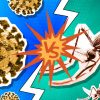
AsianScientist (Sept. 18, 2024) – People who recover from dengue are more likely to face a higher risk of long-term health complications about a year later compared to those who recovered from COVID-19, a new study has found. The research, published in the Journal of Travel Medicine, found that dengue survivors are significantly more vulnerable to issues affecting the heart, brain and immune systems. The study, led by Nanyang Technological University (NTU), Singapore, tracked health problems that arose 31 to 300 days after dengue infection and compared these to complications faced by COVID-19 survivors.
The findings showed that dengue survivors are 55 per cent more likely to experience heart complications such as irregular heartbeats, heart disease, and blood clots than those who recovered from COVID-19.
The researchers pointed out that the risk of long-term, multi-systemic complications post-dengue infection is far greater than those seen after COVID-19 recovery. This could increase the overall impact of dengue in tropical countries where seasonal outbreaks happen. With climate change expanding the range of dengue-carrying mosquitoes, more countries could be at risk.
According to the study, the health burden arising from acute dengue is substantial, with a global cost of US$8.9 billion per annum.
“We were motivated to conduct the study due to the increasing geographic range of dengue due to climate change,” said assistant professor Lim Jue Tao, at NTU’s Lee Kong Chian School of Medicine, who is also the lead author of the study. “Dengue is one of the most common vector-borne diseases globally, and long-term health issues resulting from dengue can substantially increase the healthcare burdens of the infected person and the country.”
Lim also explained the decision to compare dengue with COVID-19, noting that previous research had linked COVID-19 recovery with long-term health complications. “Our study underscores the need for people to guard against dengue in their environment and can be a resource to support public health planning,” he added.
The study, carried out on a multi-ethnic adult Asian population across Singapore, analyzed medical records of 11,707 residents with dengue and 1,248,326 who had COVID-19 (Delta and Omicron variant) between July 2021 to October 2022.
Data revealed that dengue survivors had a 55 per cent increased risk of heart complications, such as dysrhythmia, ischemic heart disease and thrombotic disorders; a 213 percent higher risk of cognition and memory disorders, and a 198 per cent higher risk of movement disorders compared to those who recovered from COVID-19.
Professor Kwok Kin-on, an epidemiologist at the Chinese University of Hong Kong, said this study is crucial as it provides a comprehensive comparison of post-recovery health issues between dengue and COVID-19 patients.
“This study offers valuable insights for healthcare planning and patient management. The findings underscore the need for increased vigilance and targeted interventions for dengue survivors to mitigate long-term health impacts,” Kwok said.
The researchers also acknowledged some limitations of the study. It only included adults aged 18 and above, meaning the results cannot be applied to children. The researchers also did not account for individual factors such as genetics, behaviour, or environmental influences that could impact the risks associated with COVID-19 and dengue.
This study was a collaborative effort involving NTU’s Lee Kong Chian School of Medicine; Ministry of Health, Singapore; Singapore General Hospital; and National Centre for Infectious Diseases, Singapore; and the National Environment Agency.
—
Source: Lee Kong Chian School of Medicine ; Image: Shelly Liew/Asian Scientist Magazine
The article can be found at Dengue versus COVID-19: comparing the incidence of cardiovascular, neuropsychiatric and autoimmune complications
Disclaimer: This article does not necessarily reflect the views of AsianScientist or its staff.

